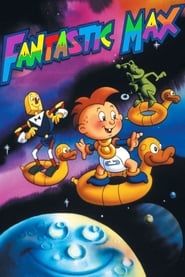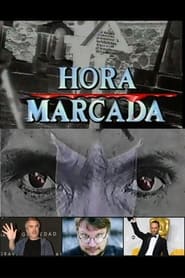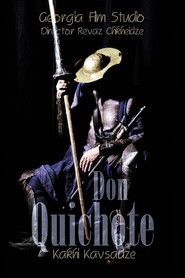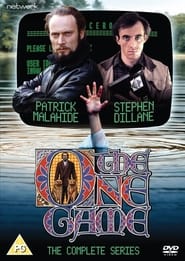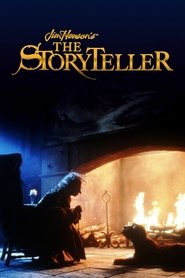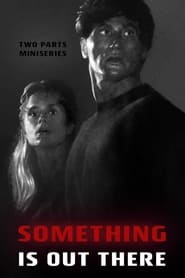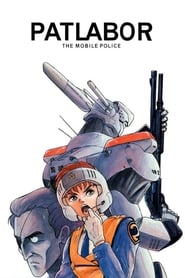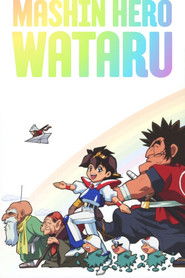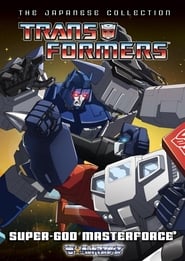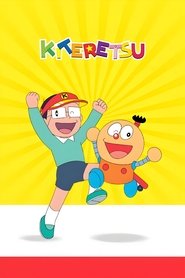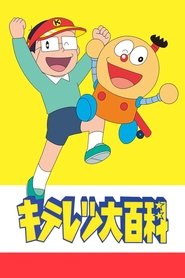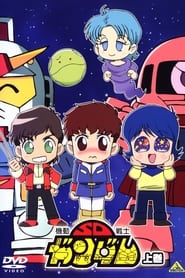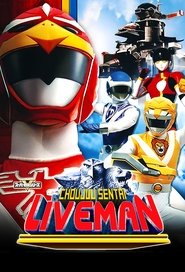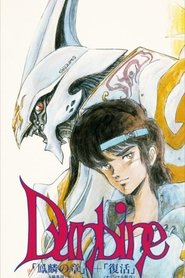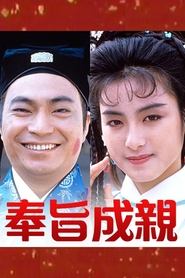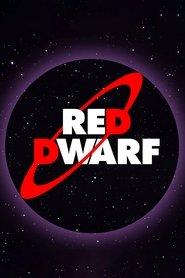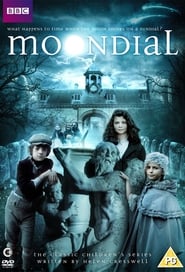New Sci Fi Fantasy TV Series on Pantaflix - Page 370
-
Fantastic Max
1988
Fantastic Max
1988
star 7.4A diaper-wearing toddler with a mohawk named Maxwell "Fantastic Max" Young has adventures in outer space with two of his toys: FX, a pull string alien doll from a planet called Twinkle-Twinkle, and A.B. Sitter, a C-3PO-like android made of blocks. -
The Marked Hour
1988
The Marked Hour
1988
star 8La Hora Marcada was a 1986 Mexican television anthology series famous for its horror and science fiction themes in the vein of the Twilight Zone. Although virtually unknown outside the country, it achieved a popular and critical success in Mexico. It had a series of rotating writers and directors, among them Emmanuel Lubezki, Guillermo del Toro and Alfonso Cuarón. -
Life of Don Quichote and Sancho
1988
star 4.7A self-proclaimed "knight" and his hapless squire travel the Spanish countryside, attacking "giants" that are really windmills in his attempt to win the love of the fair Dulcinea. The film's title is taken from the book of the same name by Miguel Unamuno. -
中国民间故事
1988
中国民间故事
1988
-
The One Game
1988
The One Game
1988
star 5The One Game is a four-part 1988 British television drama serial, produced by Central Independent Television and broadcast on ITV from 4 June to 25 June 1988. Set and filmed in Birmingham, it starred Patrick Malahide, Stephen Dillane, Pippa Haywood and Kate McKenzie, and was written by John Brown from a concept by Tony Benet. -
Echoes
1988
Echoes
1988
star 6Echoes is a four-part Irish drama miniseries based on the novel of the same name by Maeve Binchy. It was produced for Channel 4 by Working Title Films in association with RTÉ. -
The Storyteller
1988
The Storyteller
1988
star 8.2The Storyteller aided by his cynical dog, narrates classic folk tales, fables, and legends. -
Something Is Out There
1988
star 7.6Two police officers investigate a series of brutal murders in which the victims have had bodily organs removed. When one of them questions a young woman who has been seen at the crime scenes, it turns out she is an alien from an interstellar prison ship and that the murders have been committed by a powerful xenomorphic alien which had escaped. -
Patlabor: The Mobile Police
1988
star 7.4In the future, rapidly advancing technology gives birth to giant robots known as "Labors," so named for their usefulness in heavy industry. However, this also gives rise to "Labor crimes," resulting the the need for a new branch of law enforcement equipped with and dedicated to the policing of Labors. When Izumi Noa, a female police officer, becomes the newest recruit of Special Vehicles Division 2, she and her top of the line "Patrol Labor" (or "Patlabor") Alphonse are swept into a series of adventures featuring crazed construction workers, eco-terrorists, and sea monsters. -
Mashin Hero Wataru
1988
Mashin Hero Wataru
1988
star 7Mashin Hero Wataru is a comedy/adventure Super Robot multimedia franchise originally consisting of 45 episode anime series created by Sunrise first aired on April 15, 1988. Sunrise credited "Hajime Yatate" for the storyline and Shuji Iuchi directed the series. The series employs a kinetic visual gag style, often employing characters running with their feet over their shoulders derived from Sunrise's previous Super Robot anime series Choriki Robo Galatt. -
Transformers: Super-God Masterforce
1988
star 7.9Transformers: Super-God Masterforce aired on Japanese television from 1988 to 1989. Taking place after Transformers: Headmasters, it is the story of how Metalhawk and his small team of Autobots must protect Earth from the mysterious Devil Z and his Decepticon forces. Humans play many prominent roles in Masterforce, from the Decepticon husband-wife team of Giga and Mega to the Autobot's Junior Headmasters and the reluctantly-recruited Ginrai. Masterforce is often considered second only to Transformers: Victory as a fan favorite. -
Kiteretsu Daihyakka
1988
Kiteretsu Daihyakka
1988
star 8The main character is a scientific genius boy named Kiteretsu, who has built a companion robot named Korosuke. He frequently travels in time with his friends and Korosuke in the time machine he built. Miyoko is a girl in his neighborhood who is basically his girlfriend. Tongari is his rival, who happen to share some similar traits of Honekawa Suneo. Buta Gorilla is a typical neighborhood bully, who also share similar traits of Gian except that he often antagonizes Korosuke (though they are in grade school). -
Kiteretsu Daihyakka
1988
Kiteretsu Daihyakka
1988
star 8The main character is a scientific genius boy named Kiteretsu, who has built a companion robot named Korosuke. He frequently travels in time with his friends and Korosuke in the time machine he built. Miyoko is a girl in his neighborhood who is basically his girlfriend. Tongari is his rival, who happen to share some similar traits of Honekawa Suneo. Buta Gorilla is a typical neighborhood bully, who also share similar traits of Gian except that he often antagonizes Korosuke (though they are in grade school). -
Kamen Norider
1988
-
Choujuu Sentai Liveman
1988
star 8.2Yusuke, Jo, Megumi, Kenji, Gou and Rui are students at Academia but the latter three decide to turn bad and join forces with the evil army Volt. When the defectors return, their three friends are forced to combat them as Choujuu Sentai Liveman. With the help of an android ally named Colon and a few others along the way, the Liveman must save the world and their friends. -
Aura Battle Dunbine: The Tale of Neo Byston Well
1988
star 3.5Taking place 700 years after the Dunbine TV Series, "The Tale of Neo Byston Well" revolves around Shion Zaba, the reincarnation of series protagonist Sho Zama. Together with Silkie Mau, Reml Jilfried (the reincarnation of Remile Luft), and the Aura Battler Silbine, Shion must stop a twisted Shot Weapon from launching a custom-made nuclear ICBM missile that's poised to wipe out the realm. -
The New Matchmaker
1988
-
Red Dwarf
1988
Red Dwarf
1988
star 8.1The adventures of the last human alive and his friends, stranded three million years into deep space on the mining ship Red Dwarf. -
Moondial
1988
Moondial
1988
star 5.5Moondial is a British television serial made for children by the BBC and transmitted in 1988, with a repeat in 1990. It was written by Helen Cresswell, who also wrote the novel on which the series was based. The story deals with a young girl, Minty, staying with her aunt after her mother is injured in a car accident. Minty spends much of her time wandering around the grounds of a nearby mansion, and is drawn to a moondial that enables her to travel back in time, where she becomes involved with two children, Tom, who lives in the Victorian era, and Sarah, who seems to live in "the previous century" to that, and must save them from their own unhappy lives. Regarded as a nostalgic favourite by followers of 1980s BBC children's drama, Moondial employs extensive location filming and fantastical, dreamlike imagery. The series was produced by Paul Stone and directed by Colin Cant. Other cast members include Valerie Lush as Minty's aunt Mary, Arthur Hewlett as the elderly, mysterious Mr. World and Jacqueline Pearce in t
 Netflix
Netflix
 Amazon Prime Video
Amazon Prime Video
 Apple iTunes
Apple iTunes
 Apple TV Plus
Apple TV Plus
 Disney Plus
Disney Plus
 Google Play Movies
Google Play Movies
 Paramount Plus
Paramount Plus
 Hulu
Hulu
 HBO Max
HBO Max
 YouTube
YouTube
 fuboTV
fuboTV
 Peacock
Peacock
 Peacock Premium
Peacock Premium
 Amazon Video
Amazon Video
 The Roku Channel
The Roku Channel
 AMC+
AMC+
 Kocowa
Kocowa
 Hoopla
Hoopla
 The CW
The CW
 Vudu
Vudu
 Starz
Starz
 Showtime
Showtime
 PBS
PBS
 Pantaflix
Pantaflix
 FXNow
FXNow
 Tubi TV
Tubi TV
 Kanopy
Kanopy
 Comedy Central
Comedy Central
 Crunchyroll
Crunchyroll
 Microsoft Store
Microsoft Store
 Redbox
Redbox
 Sun Nxt
Sun Nxt
 ABC
ABC
 DIRECTV
DIRECTV
 Crackle
Crackle
 Fandor
Fandor
 Plex
Plex
